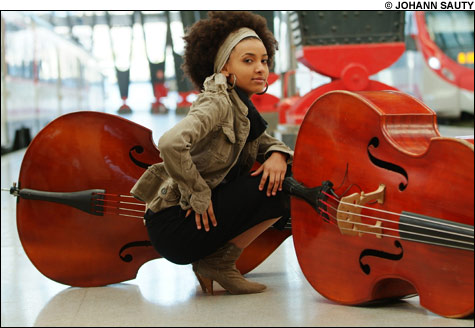
MORE THAN HAIR: A marketer’s dream, Spalding is walking the line between her serious jazz interests and pop stardom. |
WFNX Jazz Brunch Top Five
1. Robert Walter, Cure All [Palmetto]
2. Jacob Fred Jazz Odyssey, Lil’ Tae Rides Again [Hyena]
3. Chico Hamilton, The Alternative Dimensions of El Chico [Joyous Shout]
4. Simone, Simone on Simone [Koch Jazz]
5. Esperanza Spalding, Esperanza [Heads Up] |
Nothing breaks harder than jazz. In the overall retail picture, jazz accounts for about three percent of sales, and a “hit” CD is anything that exceeds 10,000 copies. These and other jazz-fan commonplaces were repeated in David Remnick’s May 19 New Yorker story about radio announcer and jazz obsessive Phil Schaap. “The school system is creating six thousand unemployable musicians a year,” Schaap told Remnick, naming Juilliard, Rutgers, Mannes, Manhattan, and, of course, Berklee among the culprits, “plus all the high schools.”Which is why there’s been such anticipation of Esperanza, the new CD by 23-year-old bassist/singer/composer Esperanza Spalding on the jazz-crossover Heads Up label. Not only has she rounded up the usual specialty-mag appearances and covers (Downbeat, Jazziz, Bass Player), but she has a cover coming in the industry tour-business mag Pollstar and a feature in jam-band glossy Relix, and in the coming weeks she’s doing a victory lap of late-night TV appearances: Letterman, Leno, and Jimmy Kimmel, plus NPR’s All Things Considered. Such attention for a young jazz musician these days is almost unheard of.

But it’s also understandable. Spalding, who comes to the Regattabar next Thursday, is a marketer’s dream — and that includes her backstory. She came to Berklee at 17, a home-schooled prodigy raised by a single mother in Portland, Oregon. Soon after graduating, at 20, she was teaching. She’d already been tapped for Joe Lovano’s quintet, and she’d toured with Patti Austin. On her own gigs, she sang in a light soprano in counterpoint to her flowing acoustic-bass lines — a gimmick, you might say, except that you need exceptional skill to do it well or at all. The organic flow of her solos and accompaniment was unforced, natural — she not only had fingers, she also had ears. She was young, female, black, and cute, and she had great hair.
Spalding was already the subject of widespread local buzz a couple of years ago, when she released her debut, Junjo, on the Spanish Ayva label. That album, with the Cuban rhythm team of pianist Aruan Ortiz and drummer Francisco Mela (both fellow Berklee-ites), was loose and lyrical — extended three-way conversations leavened by Spalding’s wordless vocals. Mixed on an equal level with the other instruments, her voice gave a special allure to an impressionistic masterpiece like Jimmy Rowles’s “The Peacocks.” At live shows around town — typically Ryles and Bob’s Southern Bistro — Spalding mixed and matched personnel and asked other vocalists to sit in, or occasionally her then-boyfriend, young trumpet star Christian Scott.
Esperanza is a more buttoned-down affair. All but one of its dozen tracks are vocal features, and the wordless vocalise is kept to a minimum, as are the bass solos. That’s no wonder: when jazz crosses over, it’s done by singers. (No one’s buying Diana Krall for her piano playing.) But if the Cleveland-based Heads Up is a crossover label, it also has acoustic-jazz cred. In addition to plenty of blue-chip fusion in its stable (Spyro Gyra, the Yellow Jackets, Najee), there’s also the late Michael Brecker’s final album, Pilgrimage, which has been on the charts for a year and is resolutely hardcore acoustic jazz, with guests like Herbie Hancock and Pat Metheny.
For Esperanza, Spalding, producing herself, stuck with her regular trio mates — her Berklee classmate Leo Genovese on piano and drummer Otis Brown — and added percussionist and Berklee faculty member Jamey Haddad. The three covers — Milton Nascimento’s “Ponta de Areia,” Baden Powell’s “Samba em Preludio,” and the Green-Heyman standard “Body and Soul” — are well chosen and well played (the Powell as a duet with flamenco guitarist Niño Josele). Not only does she sing “Body and Soul” in Spanish, she sets it to a 5/4 arrangement.
Her own love-song writing shows an affinity for pop and R&B, and she’s performing her own lyrics for the first time since her days as a teenager in a Portland band. Yet her pop is always informed with jazz. The fast patter of “I Know You Know” is stuffed with syllables for maximum rhythmic play, but it’s also undeniably hooky. “Fall In” is R&B with jazz chords, performed as a vocal/piano duo. “Precious” has a Joni Mitchell–discursive verse with an R&B chorus. “Love in Time” sounds like a ballad standard in the making, with jazz chords all the way through it and passages of straight-swing rhythm.